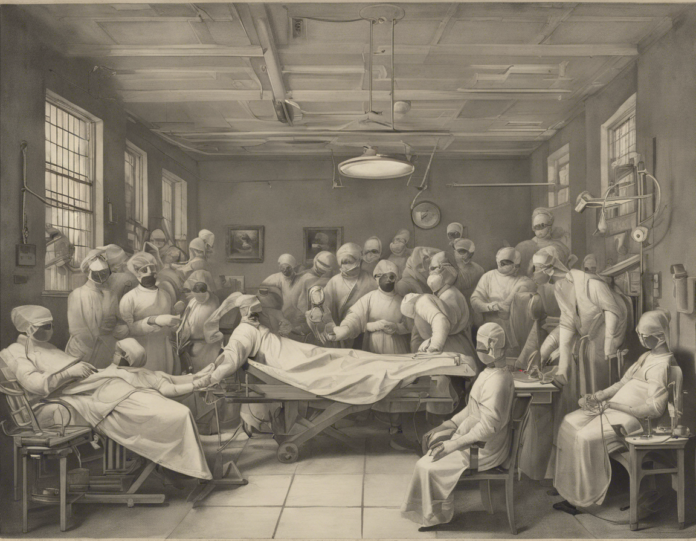Introduction
In the realm of medical science, surgery has always been a cornerstone of treatment for a multitude of ailments and conditions. Over the years, significant advancements in surgical techniques, equipment, and technology have transformed the field, making procedures safer, more effective, and accessible. From the early days of primitive tools to the development of minimally invasive procedures and robotic surgery, the evolution of surgery has been nothing short of revolutionary. This article delves into the triumph of surgery, exploring the key advancements that have shaped the field and paved the way for a new era of healthcare.
The Evolution of Surgery
Surgical Techniques
Historically, surgery was a crude and risky undertaking, often associated with high mortality rates and post-operative complications. However, advancements in surgical techniques have significantly improved patient outcomes and reduced the invasiveness of procedures. The development of aseptic techniques by pioneers such as Joseph Lister in the 19th century revolutionized surgery by minimizing the risk of infections. This paved the way for procedures like open-heart surgery, organ transplants, and complex reconstructive surgeries that were once deemed impossible.
Anesthesia
The discovery and refinement of anesthesia have been instrumental in the advancement of surgery. Before the advent of anesthesia, patients had to endure excruciating pain during surgical procedures, limiting the scope and success of interventions. The use of ether and later, more sophisticated anesthetics, enabled surgeons to perform longer and more intricate surgeries with better outcomes. Today, tailored anesthesia protocols ensure patient comfort and safety, allowing for complex surgeries to be performed with precision.
Surgical Equipment and Technology
The advent of sophisticated surgical equipment and technology has revolutionized the way procedures are performed. High-definition cameras, minimally invasive instruments, robotic systems, and advanced imaging techniques have made surgeries more precise, less invasive, and associated with shorter recovery times. For instance, laparoscopic surgery, which uses small incisions and a camera to visualize and operate on internal organs, has replaced traditional open surgeries for many conditions, resulting in reduced pain, scarring, and hospital stays.
Advancements in Surgical Specialties
Orthopedic Surgery
Orthopedic surgery has witnessed remarkable advancements in the treatment of musculoskeletal conditions. The development of artificial joints, minimally invasive arthroscopic procedures, and 3D printing technology for customized implants have revolutionized the field. Patients undergoing joint replacement surgeries can now expect faster recovery times, improved function, and longevity of the prosthetic implants.
Cardiothoracic Surgery
Cardiothoracic surgery has made significant strides in the treatment of heart and lung diseases. Innovations such as minimally invasive cardiac surgeries, robotic-assisted procedures, and transcatheter interventions have transformed the management of conditions like coronary artery disease, valvular heart disease, and congenital heart anomalies. These advancements have led to shorter hospital stays, reduced complications, and improved survival rates for patients.
Neurosurgery
Neurosurgery has benefited from advancements in imaging technology, surgical navigation systems, and minimally invasive techniques. Procedures that once required extensive skull openings can now be performed through tiny incisions with the help of specialized instruments and imaging guidance. This has improved outcomes for patients with brain tumors, spinal cord injuries, and neurological disorders, leading to better functional outcomes and quality of life.
The Future of Surgery
The future of surgery holds even more promise with ongoing developments in areas such as robotic surgery, 3D printing, artificial intelligence, and telemedicine. Robotic systems with enhanced dexterity and precision are poised to redefine surgical procedures, allowing for more complex operations to be performed with greater accuracy. 3D printing technology is revolutionizing the production of patient-specific implants and surgical tools, enabling personalized treatment approaches. Artificial intelligence algorithms are being integrated into surgical systems to assist in preoperative planning, intraoperative decision-making, and postoperative care. Telemedicine platforms are expanding access to surgical expertise and follow-up care, particularly in remote or underserved regions.
The Impact of Advancements in Surgery
The advancements in surgery have had a profound impact on patient care, healthcare systems, and society as a whole. Patients now have access to safer, more effective treatment options with reduced risks and faster recovery times. Healthcare providers can offer specialized surgical interventions with better outcomes and fewer complications. Healthcare systems benefit from reduced hospital stays, healthcare costs, and a higher quality of care. Society at large reaps the benefits of a healthier population, improved productivity, and enhanced quality of life.
Conclusion
In conclusion, the triumph of surgery is a testament to human ingenuity, innovation, and perseverance in the face of complex medical challenges. The evolution of surgical techniques, anesthesia, equipment, and technology has transformed the field, making once unimaginable procedures routine and life-saving. As we look to the future, the continual advancement of surgery holds immense promise for improving patient outcomes, advancing medical knowledge, and shaping the healthcare landscape for generations to come.
Frequently Asked Questions (FAQs)
- What are the benefits of minimally invasive surgery?
-
Minimally invasive surgery offers benefits such as smaller incisions, reduced pain, faster recovery times, and shorter hospital stays compared to traditional open surgeries.
-
How has robotic surgery impacted surgical outcomes?
-
Robotic surgery has enhanced surgical precision, dexterity, and visualization, leading to improved outcomes, reduced complications, and shorter recovery times for patients.
-
What role does 3D printing play in modern surgery?
-
3D printing technology enables the production of patient-specific implants, surgical guides, and instruments, allowing for customized treatments and improved surgical outcomes.
-
How has telemedicine influenced surgical care?
-
Telemedicine platforms provide access to surgical consultations, follow-up care, and second opinions remotely, expanding access to specialized surgical expertise and improving postoperative outcomes.
-
What are the ethical considerations surrounding advancements in surgery?
- Ethical considerations in surgery include informed consent, patient autonomy, equitable access to care, resource allocation, and the responsible use of technology to ensure patient safety and well-being.

